Microsoft’s controversial OOXML private file format was voted in as standard DIS29500 by the International Standards Organization, err… the “I Sold Out” (ISO) this weekend. Amid serious allegations of irregularities in the voting process, political manipulation, cronyism, influence trading and unfair practices employed to secure favorable votes, ISO committees stuffed with inept members representing various countries voted 75% in favor of OOXML.
All for a document format! What a shame to demolish the credibility of such a prestigious standards body. And for a format from a corporation which fiercely opposes competition, cannot tolerate open standards and cannot get over misusing its corporate reach.
The Open Malaysia blog has some interesting stats about the vote.
* 24 out of 32 P-Members (Participating Members) voted in favor of OOXML (75%). The requirement for confirmation is >= 66.66%.
* A total of 61 P-Members and O-Members (Observing and Other Members) voted in favor.
* 10 out of 71 member countries voted against (14%).
* 16 countries abstained and were not counted in the total.
According to noooxml.org , a lot of last minute vote switching occurred due to heavy influence brokering by Microsoft, its subsidiaries and its business partners. This carried OOXML forward to approval. But approval at what cost? Desperate efforts to win by compromising institutional integrity can only backfire and is already leading to erosion of brand credibility for Microsoft around the world. Microsoft is its own worst enemy.
Another report discussing the problems at the Ballot Resolution Meeting (BRM) can be found at Groklaw. Ubuntu’s Mark Shuttleworth has also commented about the process in an interview.
Author Archives: Alolita Sharma
Mozilla turns 10!
Mozilla’s 10th birthday party in SF on March 31st felt like a Netscape reunion. Hundreds of geeks and cat-herders, many with Netscape jackets, shirts, and nostalgia, gathered together to celebrate Mozilla’s phenomenal success. Mitchell Baker, Brendan Eich and the Mozilla community were all there to party, to enjoy the cake and to be merry. As the galactic chocolate birthday cake was being cut, Mitchell predicted that many opportunities and challenges lay ahead in the next 10 years and that the greatest achievements for Mozilla are yet to come.
Mozilla has millions of reasons to celebrate. After 500 million downloads, Firefox stands tall as the world’s best free and open source web browser. After 500 million downloads, Firefox has single-handedly turned the tables on IE and has prevented Microsoft from closing the Web. Mozilla is Netscape done right.
Life would be almost unimaginable without Firefox.
Way to go! Mozilla. Live long and prosper.
OSBC 2008: Open Source and True Innovation
Red Hat CEO Jim Whitehurst delivered the first keynote of the Open Source Business Conference in San Francisco with a state of the union on Red Hat’s leadership in open source – $500 million dollars in revenues, millions of servers, thousands of customers. Whitehurst highlighted Red Hat’s leadership in the Linux market with 80 percent marketshare with RHEL and 30 percent of the application server market with JBoss. His speech sounded like it was being delivered to “shareholders” of open source.
The new CEO is not quite 90 days into his job. But he’s been all around the globe – meeting customers, heads of government and policy makers in China, Russia, and Europe. He feels that open source is gaining more popularity internationally due to anti-US sentiment.
Whitehurst explained that one of Red Hat’s key challenges is to bring the value of the open source community development model to enterprise customers. For example, the “oVirt” project for building management tools around virtualization is helping Red Hat engage enterprise customers as participants in building these tools together. Another challenge is for Red Hat to be the defining company of open source for the 21st century – by changing the way technology is developed through “iterative innovation”. Patent reform is one of the biggest issues that Red Hat is currently facing and he hoped to see a broader strategy of protecting the whole community instead of just focusing on individual companies.
OSBC 2008: Bringing Television to the Web with Open Source
In another interesting keynote at OSBC by Steven Pearson, VP of Advanced Technologies at CBS Interactive, we learned about how deeply open source is being used in his organization. Almost every online property of CBS – CBS.com, CBSSports.com, CBSNews.com, Last.fm – is using open source for their application requirements, ranging from news simulcasts, live election reporting to connecting users who share similar tastes in music and customizing radio streams.
Linux, Apache, MySQL, Perl, Lucene, Tomcat, PHP, Spring are among technologies that CBS is using heavily. Open source has offered greater ROI for CBS with increase in speed of development, ease of access to source code and documentation, and the ability to enhance source code when needed. CBS Interactive has also contributed back to several open source projects such as CPAN.
The future of open source is bright at CBS with more and more open source projects for the online services that CBS is offering its audiences. Interestingly, Pearson did not feel that competition with other media organizations such as NBC, ABC, and Fox prevents CBS from contributing to open source projects. After all, having content platforms, made robust through open source practices, for delivering ads helps drive up CBS’s revenues.
Support ODF on Document Freedom Day
 Keep your data free. Free from vendor lock-in. Support Document Freedom Day on March 26. Activities and events will be held around the world to promote awareness of free document formats such as ODF.
Keep your data free. Free from vendor lock-in. Support Document Freedom Day on March 26. Activities and events will be held around the world to promote awareness of free document formats such as ODF.
It is great to see that India voted NO for OOXML yesterday. According to Venky Hariharan, 13 members voted “No”, 5 members voted “Yes” (including Microsoft India, Infosys, TCS, Wipro and NASSCOM), 1 member abstained and 3 members did not attend.
It appears that revenue partners and their special interests take precedence for India’s software export companies over preserving freedom of knowledge and rights of users to share data using open formats. Can money buy standards?
Take a stand and just say no! Support free document formats next week on March 26th. Organize awareness programs in your community, work with your favorite Linux Users Group and support Document Freedom Day.
GNUnify 2008 – It only gets better!
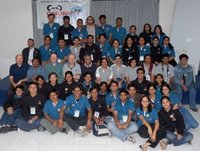 GNUnify opened with a roar this year! More than a thousand smart developers and hackers, technology-hungry engineering students, foss enthusiasts, international open source gurus and successful entrepreneurs gathered for two days of great tech talks, install fests, hack fests, BOFs and lots of hallway and canteen conversations. The energy throughout the conference was amazing. Every year, I’ve seen this energy rise and add to the momentum of the conference.
GNUnify opened with a roar this year! More than a thousand smart developers and hackers, technology-hungry engineering students, foss enthusiasts, international open source gurus and successful entrepreneurs gathered for two days of great tech talks, install fests, hack fests, BOFs and lots of hallway and canteen conversations. The energy throughout the conference was amazing. Every year, I’ve seen this energy rise and add to the momentum of the conference.
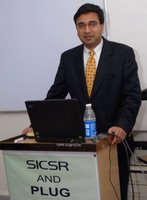 Harshad and his organizing team did a phenomenal job of covering an excellent range of topics in the conference program – from Mozilla Prism, Ruby on Rails, PHP, MySQL, Erlang, Django to visual design tips, network management and security. Every room was packed with spillover seating on the speaker dais. BOFs on IndLinux by Karunakar, LinuxChix India by Runa were well attended. The workshops and hands-on tutorials were packed beyond lab capacities with more than 80-90 attendees in each session. Topics such as mobile Linux, Ruby on Rails were immensely popular and the install fests for Fedora and Mandriva were just plain fun.
Harshad and his organizing team did a phenomenal job of covering an excellent range of topics in the conference program – from Mozilla Prism, Ruby on Rails, PHP, MySQL, Erlang, Django to visual design tips, network management and security. Every room was packed with spillover seating on the speaker dais. BOFs on IndLinux by Karunakar, LinuxChix India by Runa were well attended. The workshops and hands-on tutorials were packed beyond lab capacities with more than 80-90 attendees in each session. Topics such as mobile Linux, Ruby on Rails were immensely popular and the install fests for Fedora and Mandriva were just plain fun.
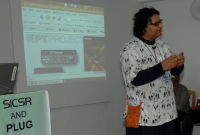 There were a lot of talks I wanted to attend but could only manage to squeeze into Brian‘s talk on 10 things to know about open source, Niyam’s talk on visual design (really well done), Chander’s talk on building a open source company (great talk!) and David’s MySQL state of the union.
There were a lot of talks I wanted to attend but could only manage to squeeze into Brian‘s talk on 10 things to know about open source, Niyam’s talk on visual design (really well done), Chander’s talk on building a open source company (great talk!) and David’s MySQL state of the union.
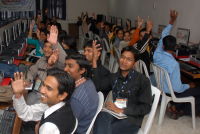 I ended up helping out for the Ruby on Rails workshop by Bob and it was sensational to see 80 keen hackers going through the process of building a Rails application and building an interface to MySQL. Talk about some serious energy, enthusiasm to learn and hack some cool code!
I ended up helping out for the Ruby on Rails workshop by Bob and it was sensational to see 80 keen hackers going through the process of building a Rails application and building an interface to MySQL. Talk about some serious energy, enthusiasm to learn and hack some cool code!
I particularly enjoyed meeting FOSS friends from all over India – from Chennai, Bangalore, Hyderabad, Mumbai, Delhi, Kolkata, Pune, Goa and many more places. My congratulations to Harshad, his super team of wonderful volunteers from SICSR’s student community and the tireless Pluggies (Sudhanwa and his team) who put in countless hours of effort and commitment to make GNUnify a rip-roaring success this year. Thanks to Vijay for his great photo coverage of Team GNUnify!
GNUnify just keeps getting better ![]() and better every time! Let’s keep it going like the Energizer Bunny!
and better every time! Let’s keep it going like the Energizer Bunny!
LAMP flickers with MySQL acquisition by Sun
Sun Microsystems announced today that it will buy MySQL for a billion dollars, paying off the MySQL founders and investors.
For only a billion dollars… Now, that’s a steal, don’t you think? If MySQL had gone IPO perhaps they could’ve raised 5 billion dollars or more – I believe they could have because the open source market is only growing stronger. On the same day, Oracle announced its acquisition of BEA for 8.5 billion dollars – just for acquiring market share. So a billion dollars for MySQL seems cheap.
How does this affect Linux? Sun has marketed open source initiatives such as OpenSolaris, Netbeans, GlassFish and OpenOffice. Now MySQL joins that list. MySQL is a key player in the Linux solution set. Linux could benefit if MySQL is provided with more resources to help build more powerful open source solutions. Linux could be hurt if MySQL becomes more encumbered and less free.
2008 promises to be an interesting year for open source. Let’s hope Sun will play to its strengths of great engineering and innovation and support the entire open source community. This means Linux too.
Some interesting comments on this acquisition:
1) Glyn Moody
2) Groklaw
3) Matt Asay
4) Motley Fool
Uniting Open Minds at GNUnify
I’ve been part of GNUnify for a few years now – this will be my fifth year. It has been a marvelous experience to see the conference grow and gain wide national and international participation. GNUnify is organized by the professors and graduate students of the Symbiosis Institute of Computer Studies and Research (SICSR) in association with the Pune Linux Users Group (PLUG) to provide a platform for exchange of ideas and knowledge among industry professionals and academia. This year promises to be exciting – with international keynotes, in-depth technical sessions, hands-on workshops on the latest FOSS technologies, install fests and BOFs. Two days of intense discussions, hallway networking, learning about red-hot open source applications, BOF-ing with the gurus and of course enjoying SPDPs. For those who don’t know about the famous “SPDP” – come to GNUnify to find out more about it. Be there on February 8-9, 2008!
Pune’s PLUG Mash a resounding success
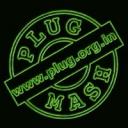 Participating at PLUG’s mashup camp in October was an exciting opportunity for me to be among friends and Pluggies again.The PLUG Mash organized by the Pune Linux User’s Group and its friends and supporters was a resounding success. The 2-day camp had a combination of formal talks as well as a hack-a-thon for FOSS hackers to gather together and code. Major sponsors including Thoughtworks and Zmanda did an outstanding job of participating in the sessions. I found the talks by various open source contributors – Chris Stevenson (of Thoughtworks), Ramki (of Red Hat), Friji (of Radio Schizoid), Satish (of Red Hat), Valsa (of Intel), KK George (of Zmanda), Niyam (creative guru), and Karunakar (of Indlinux.org) – led to a valuable discussion of how developers, users and FOSS advocates are doing their part in making open source contributions possible from India. I presented about the Open Source Initiative (OSI) and its global initiatives and enjoyed the discussion thereafter about how OSI could become more pertinent in India’s ecosystem.
Participating at PLUG’s mashup camp in October was an exciting opportunity for me to be among friends and Pluggies again.The PLUG Mash organized by the Pune Linux User’s Group and its friends and supporters was a resounding success. The 2-day camp had a combination of formal talks as well as a hack-a-thon for FOSS hackers to gather together and code. Major sponsors including Thoughtworks and Zmanda did an outstanding job of participating in the sessions. I found the talks by various open source contributors – Chris Stevenson (of Thoughtworks), Ramki (of Red Hat), Friji (of Radio Schizoid), Satish (of Red Hat), Valsa (of Intel), KK George (of Zmanda), Niyam (creative guru), and Karunakar (of Indlinux.org) – led to a valuable discussion of how developers, users and FOSS advocates are doing their part in making open source contributions possible from India. I presented about the Open Source Initiative (OSI) and its global initiatives and enjoyed the discussion thereafter about how OSI could become more pertinent in India’s ecosystem.
Many thanks to my friends for putting in a lot of hard work, for being such fantastic hosts and making this 2-day camp in Pune memorable and successful for me. The great conversations, wonderful food, and the “coffee” added just the right touch. And reminded me of what makes Pune’s community so enjoyable to be part of.
Pharma patent loss is a win for healthcare and free software in India
In January 2006, India’s Patent Office rejected a patent application for Gleevec, a leukemia cancer drug by Swiss pharmaceutical Novartis. Now, in August 2007, the Chennai High Court has rejected Novartis’ appeal to overturn this rejection.
Novartis claims that India’s ruling will stunt R&D and innovation in pharmaceuticals and violates WTO intellectual property agreements. But the Indian government sees this decision as helping ensure that affordable medicines continue to be available for her people and those of other developing countries. Such medicines are essential to combat killer diseases like AIDS and cancer. Indian companies manufacture generic Gleevec (known as Glivec in India) for one-tenth the price offered by Novartis.
Why does this matter?
India’s ruling will deter international pharma giants from trying to extend their monopolies by patenting newer versions of existing medicines. This ruling allows India to continue manufacturing inexpensive generic drugs. For example, 85% of AIDS generics to Africa are provided by India’s pharmaceuticals. That’s significant.
This precedent also establishes a model for rejecting software patents in India. The arguments that favor availability of generic medicines equally apply to free and open source software (FOSS). India cannot afford the monopolies and high prices brought about by software patents. FOSS is the only practical way developing nations can afford long-term, large-scale IT automation. Without automation, India and others cannot scale to provide the infrastructure and banking, education and health care needed to ensure prosperity for billions of people across the globe.